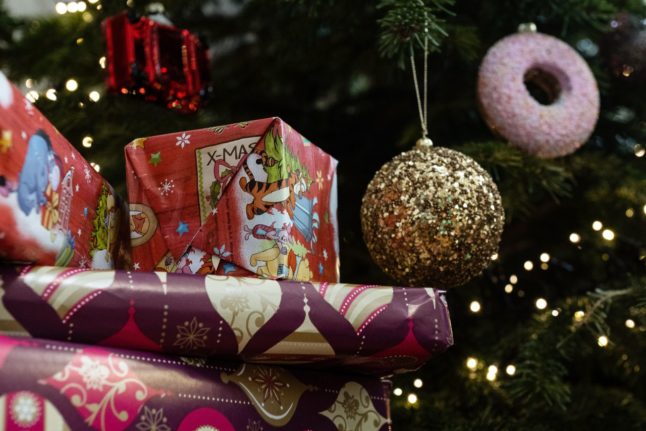At first glance, it looked like a perfectly ordinary – albeit dated – politician’s photo op. A young Angela Merkel standing next to an ironing board with a gleaming smile on her face.
But those who looked closer will have seen that Germany’s former chancellor hasn’t got trousers and shirts piled up on her ironing board, but rather some delightfully vintage wrapping paper.
As you might imagine, the picture had quite a few people scratching their heads when it suddenly appeared on X, or the website formerly known as Twitter, last week.
VIDEO: Watch Merkel’s funniest moments
Numerous questions sprung to mind. Is ironing out the creases in wrapping paper something that Germans actually spend time doing? Why would anyone add an extra chore to their list at Christmas? Should we have been ironing our gift wrap all this time?
Writing on X, Economist journalist Stanley Pignal summed up what many were thinking by saying he found the picture “quite confusing”.
“Is this… a thing in Germany?”, he asked. “Is there much ironing of wrapping paper?”
Is this a…. thing in Germany? is their much ironing of wrapping paper? still find this quite confusing. pic.twitter.com/yYLB8BhjI0
— Stanley Pignal (@spignal) December 13, 2023
Riding to the rescue, several Germans – and people with German heritage – tried to explain the concept of de-creasing your gift wrap.
As it turns out, the practice is a thing in Germany, but a thing very much associated with the thrifty olden days and moral attitudes to avoiding waste.
Germans in particular had memories of their older relatives carefully recycling their wrapping paper.
Spiegel journalist Jan Petter, for example, said his Swabian grandma had done it – and had also ensured the children unwrapped things carefully to avoid ruining the precious paper.
This certain fits in with the stereotypes that Swabians are both obsessed with tidiness and very careful with their money.
It is. My swabian grandma did it for decades. She also controlled how we unwrapped our Christmas gifts in order to recycle as much as possible… 🌚
— Jan Petter (@lepettre) December 13, 2023
As one X user quipped, the practice of ironing gift wrap was common around the same time comedian Otto Waalkes made a joke about how best to recycle a tea-bag – a comparison that highlights just how waste-avoidant that era was.
READ ALSO: Thrifty Swabians and haughty Hamburgers – A guide to Germany’s regional stereotypes
According to X user Thomas Wehling, Merkel’s habit of ironing wrapping paper could also be linked to her childhood in the GDR, where many products were scarce, and her disciplined Protestant upbringing.
Yes and no.
Ms. M. grew up in the post-war GDR which was ridden by economic shortages.
Ms. M. is also the daughter of a protestant priest. Protestant values among others are order and thriftiness.
So, this picture does not surprise me at all.
— Thomas Wehling (@Thomas__Wehling) December 14, 2023
As climate advocate Thea Ehlich explained, however, the photo op had much more to do with Merkel’s job when the picture was taken.
“Merkel was the federal minister of the environment at the time,” she wrote. “She wanted to show that you can reuse lightly wrinkled wrapping paper by simply ironing it again.”
These days, it seems, chucking wrapping paper away after a single use is no longer seen as particularly decadent, meaning most younger Germans are probably unlikely to be ironing their gift wrap anytime soon.
But with Merkel’s old photo resurfacing online, some media outlets have jumped on the bandwagon with special features on how best to recycle your wrapping paper – and yes, ironing is one of the tips.
Given that “waste not, want not” is a philosophy that’s coming back into fashion lately, don’t be too surprised if you see the German in your life getting out the ironing board this season for a far more eco-conscious Christmas.




 Please whitelist us to continue reading.
Please whitelist us to continue reading.
Member comments